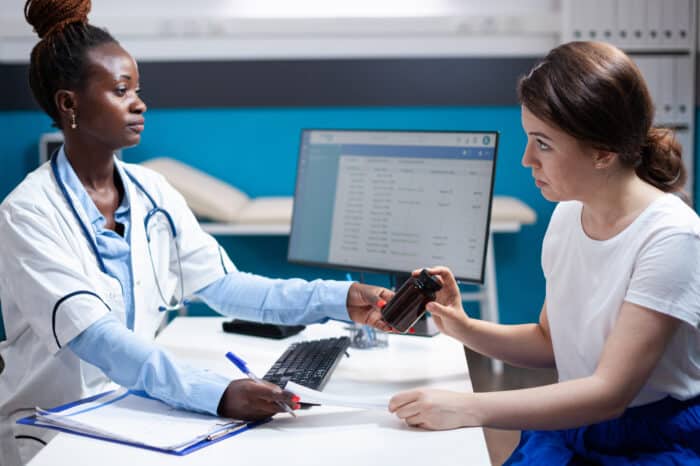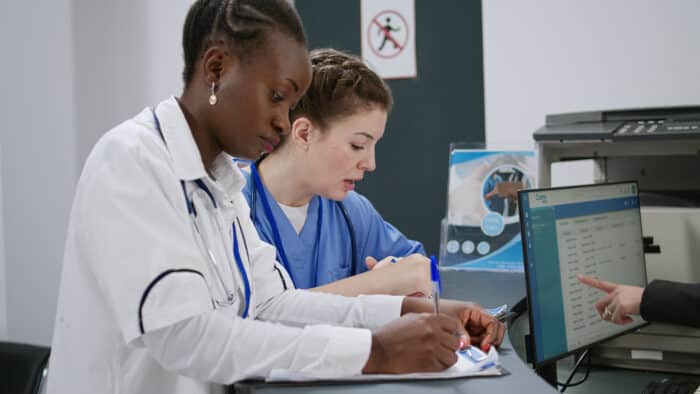Ever thought about getting into medical coding?
Yes? Well, good news – we’re about to explore the world of online medical coding courses in this article.
Whether you’re new to the field or already in healthcare, online courses make learning super convenient.
But are online courses reliable? Do they provide you with certification?
In this article, we’ll answer all such burning questions you might have, and cover everything about these courses, from what they involve to picking the perfect one for you.
So, let’s dive right in.
What is a Medical Coder? And What Do They Do?
So, you know when you go to the doctor and they note down all sorts of stuff about your visit?
Well, a medical coder takes all that info and turns it into special codes.
These codes are like a secret language used for billing, insurance stuff, and keeping your medical records in order.
Let’s break down their duties a bit more:
1. Translate Medical Records: Imagine medical records are like puzzle pieces, and medical coders are the ones who put them together in a way that everyone understands. They look at everything from what the patient’s problem is, what treatments they had, to what medications they took.
2. Assign Codes: Instead of using long descriptions, they use special codes to represent each piece of information. It’s like using a secret language that doctors, insurance companies, and hospitals all understand.
3. Ensure Accuracy in Codes: Their job is to make sure they pick the right code for each piece of information. They need the right code to make sure everything matches up correctly.
4. Follow Regulations: Think of medical coding rules like a constantly changing game. Medical coders need to keep up with the latest rules and guidelines to make sure they’re doing everything correctly.
5. Helping with Billing Processes: One big part of their job is making sure doctors and hospitals get paid for the care they provide. By coding everything accurately, they help make sure the bills get paid on time.
Also See: What is Medical Billing and Coding?
What You Need to Become a Medical Coder
Alright, so if you’re thinking about becoming a medical coder, you’re going to need a few things to make it happen – think of them as your toolkit for success.
There are three main things you need to excel as a medical coder: Training, Certification, and Experience.
Let’s delve deeper into how they’re each important:
Training-
First up, you’ll need some training. That means diving into courses or programs that teach you all about medical coding. It’s like learning a new language, but instead of words, you’re learning those special codes we talked about earlier.
You can complete your medical coding training through various methods, either via the traditional way of getting an associate degree or a diploma from a university or community college or through online training courses.
Certification-
Next, let’s talk about certification. Just like getting a driver’s license proves you can drive, getting certified shows you know your stuff when it comes to medical coding.
There are a few main certifications that medical coders typically pursue:
1. Certified Professional Coder (CPC): Offered by the American Academy of Professional Coders (AAPC), the CPC certification is one of the most widely recognized credentials for medical coding professionals. It demonstrates proficiency in CPT, ICD-10-CM, and HCPCS Level II coding systems.
2. Certified Coding Specialist (CCS): Provided by the American Health Information Management Association (AHIMA), the CCS certification is geared towards coding professionals working in hospital settings. It validates skills in inpatient and outpatient medical coding.
3. Certified Coding Associate (CCA): Also offered by AHIMA, the CCA certification is an entry-level credential for individuals who are beginning their career in medical coding. It covers foundational coding skills and knowledge.
4. Certified Coding Specialist – Physician-Based (CCS-P): This certification, also offered by AHIMA, is specifically designed for coding professionals working in physician-based settings. It demonstrates expertise in coding for physician services.
Experience-
Last but not least, you will also want to gain some experience before you dive into the field of medical coding. This could mean doing internships or externships, working in entry-level coding positions, or even volunteering at healthcare facilities. The more you dive into the coding world, the better you’ll get at it.
Read: How Long is Medical Billing and Coding School
Medical Coding Classes Online: Are They Better?
In today’s fast-paced world, online classes are gaining immense popularity, and for good reason. These digital learning platforms offer a variety of perks that are ideal for all aspiring medical coders.
Here’s why people love online classes:
1. Flexibility: With online classes, you have the freedom to study when and where it suits you best. This flexibility is especially beneficial for people who are juggling busy schedules, such as working professionals or parents.
2. Accessibility: Online classes are accessible from anywhere with an internet connection, which means you don’t need to travel to a physical classroom. This accessibility is particularly good for those in remote areas or where good physical courses aren’t available.
3. Cost-Effective: Online classes often have lower tuition fees compared to traditional in-person programs. Additionally, you can save money on commuting, parking, and other expenses associated with attending on-campus classes.
4. Personalized Learning: Online courses offer a range of learning resources, which means you get to tailor your learning experience to your preferences. You can also revisit materials as needed and learn at your own pace.
Introducing Our Top Pick for 2024: The Best Online Coding Class
Now that you know online courses are better, you might be wondering how to pick the best from the sea of medical coding online programs out there.
We’re here to help you with exactly that.
Let us introduce you to:
PREPPY’s Online Medical Coding Training Program.
We might just seem a bit biased, but hear us out.
Preppy goes above and beyond every expectation you might have from an online medical coding program, in every aspect of training and preparation.
Let us tell you how:
1. University Partnership:
Preppy has teamed up with Auburn University, an accredited institution, ensuring that their training program meets the highest educational standards. This partnership adds an extra layer of credibility, which will give you peace of mind knowing that you are receiving a top-notch education.
2. Certificate of Completion:
Upon successful completion of the program, you will receive a Certificate of Completion from Auburn University. This credential carries a lot of weight in the industry and will boost your resume when pursuing job opportunities.
3. Affordability:
If you’re worried about the tuition fees, don’t worry. Preppy understands the financial challenges many aspiring medical coders face. That’s why they’ve made affordability a priority, offering a training option that won’t break the bank.
4. 100% Online Learning & Self-Paced Courses:
The program is entirely online, which means you have the flexibility to access course materials from anywhere with an Internet connection. With self-paced learning, you can fit your studies around your busy schedules or personal commitments.
5. Certification Exam Prep:
Preppy’s curriculum is carefully crafted to fully prepare students for national certification exams, like the AAPC’s CPC exam. This means you’re not only well prepared for the career but also for the certification exam, which will help you set foot in the medical coding industry ASAP.
6. Fast Course Completion:
Unlike traditional programs, Preppy offers flexibility in training duration, which allows you to complete the program in as little as four months. This means you can kickstart your career sooner and enter the workforce faster.
7. Hands-On Externships:
Preppy understands the importance of real-world experience. That’s why they offer externship opportunities, giving you practical experience in healthcare settings to apply your knowledge and build professional connections.
8. Free Laptop:
Enrolling in Preppy’s program comes with a bonus – a free laptop! This will further ensure that you have all the necessary technology to excel in your studies and beyond, without worrying about additional expenses.
9. Ongoing Support:
Throughout the program, Preppy provides continuous support to its students. From a dedicated Student Coordinator to 24/7 technical assistance, Preppy ensures students have the resources they need to succeed.
Click here to Learn More about Preppy’s Online Medical Billing and Coding Program!
Medical Coding Online Courses Cost
Another common burning question among aspiring medical coders is, how much exactly do online medical coding courses cost?
Well, it depends on the type of program you choose. Generally, the tuition fee for online medical coding courses can range from $2,000 to $5,000.
It is important to note that these figures are dependent on additional factors and expenses such as materials, examination costs, and more.
See: Medical Billing and Coding Online Courses Cost
Top Skills Required to Become a Medical Coder
Being a medical coder isn’t just about typing numbers – it’s about having specific talents to make sure everything is accurate and smooth.
There is a certain set of skills you may require to become a successful medical coder and to excel at this job.
Let’s take a look at them:
- Attention to Detail: Medical coding is all about accuracy. You’ll be dealing with tons of codes and patient records, so being meticulous and paying close attention to detail is important. One tiny mistake could lead to big problems down the line, so it’s essential to get it right the first time.
- Analytical Skills: You’ll need to analyze medical records, decipher diagnoses, treatments, and procedures, and then assign the correct codes. Having strong analytical skills will help you navigate through complex information and make sense of it all.
- Knowledge of Coding Systems: There are different coding systems used in medical coding, like ICD-10-CM for diagnoses and CPT for procedures. You’ll need to have a solid understanding of these coding systems and stay updated with any changes or updates to ensure accurate coding.
- Medical Terminology: As a medical coder, you’ll need to familiarize yourself with medical terms and abbreviations to effectively code patient records.
- Computer Proficiency: Since medical coding is largely done using computer software, having good computer skills is a must. You’ll need to navigate through different programs, input data accurately, and generate reports, so being comfortable with technology is essential.
- Time Management: In the world of medical coding, time is of the essence. You’ll often have tight deadlines to meet, so being able to manage your time effectively and prioritize tasks is key to staying on top of your workload.
- Communication Skills: While much of your work as a medical coder will be done independently, you’ll still need to communicate effectively with healthcare providers, billing specialists, and other members of the healthcare team. Clear and concise communication ensures that everyone is on the same page and helps prevent any coding errors or misunderstandings.
Conclusion
Online medical coding courses offer a convenient and accessible pathway to mastering the skills needed for success in this field.
With the flexibility to study at your own pace, access from anywhere with an internet connection, and affordability compared to traditional options, these courses provide an excellent opportunity to kickstart or advance your career in medical coding.
So, whether you’re a beginner or looking to enhance your skills, online courses empower you to learn on your terms and unlock countless opportunities in the ever-evolving world of medical coding.
Online Medical Coding Courses FAQs
What is the shortest program for Medical Billing and Coding?
The shortest program for medical billing and coding typically ranges from 4 months to 1 year in duration. These programs are often online certificate programs or diploma courses. While the duration may differ depending on the institution and program structure, shorter programs focus on core concepts and practical training to prepare students for entry-level positions in medical billing and coding.
Are online classes better for Medical Billing and Coding?
Yes, online classes are often better for Medical Billing and Coding due to their flexibility, accessibility, and personalized learning experience. Online classes allow students to study at their own pace, access course materials from anywhere with an internet connection, and choose learning methods that suit their preferences. Additionally, online programs often collaborate with industry experts to ensure curriculum relevance and offer networking opportunities with peers and instructors.
What medical coding certification is best?
The Certified Professional Coder (CPC) credential offered by the American Academy of Professional Coders (AAPC) and the Certified Coding Specialist (CCS) credential offered by the American Health Information Management Association (AHIMA) are widely recognized and respected certifications in medical coding. Both demonstrate proficiency and are highly valued by employers in the healthcare industry.
What is the fastest way to become a Medical Coder?
Online programs offer the shortest courses, such as Preppy’s, that can be completed in as little as 4 months. This means that you can become a medical coder faster, and start your career quicker.
Related Resources:
Related Articles
-
How to Be Successful in College in 2022 – 7 Simple Tips to Succeed
-
How Do Scholarships Work? Read This First…Truth is Shocking
-
7 Best College Majors 2024: What Should I Major In?
-
How to Choose a College – 10 Things You Must Consider in 2024
-
Why Go to College? Top 13 Benefits for Adult Students in 2022
-
Top 5 Best Alternatives to Community College for 2024









